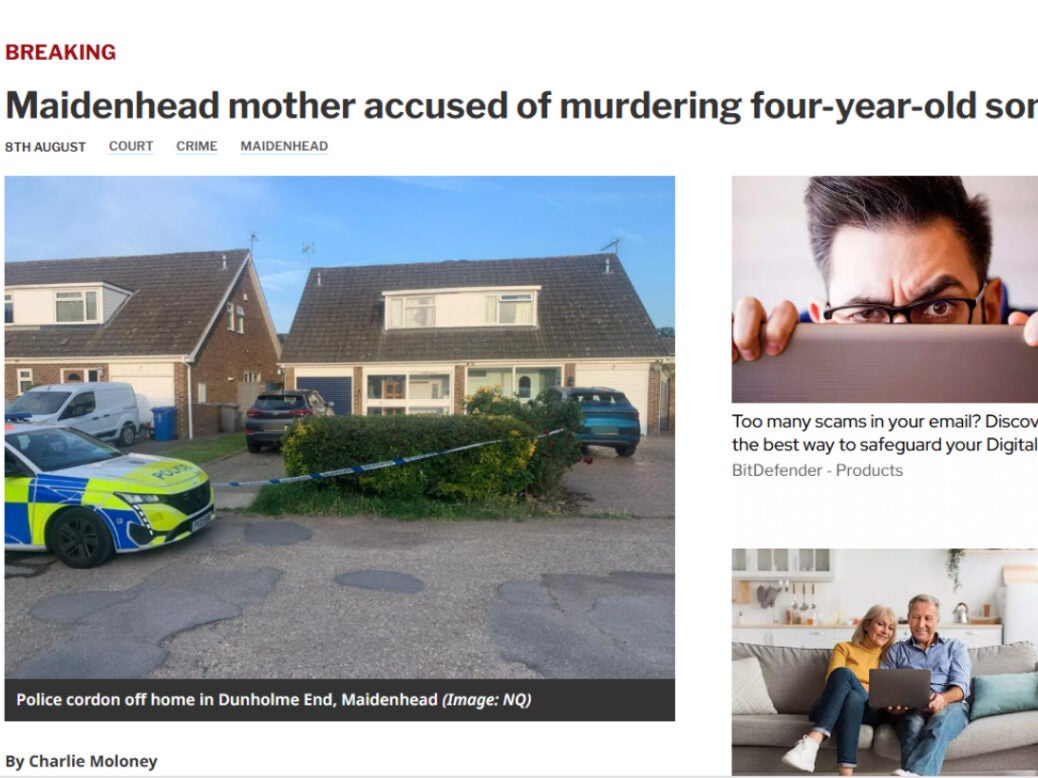
Court appearances involving a woman accused of stabbing a four-year-old child to death were not attended by journalists, allowing a judge to impose an incorrect anonymity order.
Charlie Moloney, freelance journalist and News Associates media law tutor, warned of the consequences of a lack of court reporters after posting on Linkedin about an incorrect anonymity ban being applied in a murder pre-trial hearing.
The case involved a boy who was found dead with multiple stab wounds at a property in Maidenhead, with a 37-year-old woman charged with his murder. No journalists attended the pre-trial hearing at both the magistrates and crown court, and no one challenged this motion until Moloney took action one month later.
“This is what happens when there are no court reporters left,” said Moloney, who successfully challenged the anonymity order.
This ban was lifted on Friday 8 August, allowing the case to be reported on more fully, and revealing the accused is the boy’s mother.
An updated post by Moloney said: “In response to my application, [His Honour Judge] Nawaz ruled: ‘In my judgement the application of the section was not justified in law. The only person under 18 is the deceased. Indeed if applied the order would be without limitation in time given the only under 18 person will never reach that age.
“In the circumstances the prohibition imposed under S45 of the YJCEA 1999 is discharged.’”

Prevents ‘reporting altogether’
Moloney told Press Gazette: “Magistrates often make the mistake of thinking a child can be made anonymous even if they’re not alive anymore. Anonymity orders are a massive restriction on the ability to report. Often there’s good reason for it but in this case, due to jigsaw identification, it can prevent reporting altogether.”
Moloney said a higher number of incorrect reporting restrictions are being made due to a decline of court reporters, as “very well-funded defendants” have “gained a lot of ground” in arguing that privacy law can protect identities in court.
“There’s always been the journalists pushing back against that sort of momentum,” said Moloney. “Now, that opposite force – the journalist – has been removed, the push for anonymity has just continued without any opposition. It’s just sweeping everything else away.
“The appetite for more reporting restrictions only seems to grow with the eating. The more ground is gained, the more you can’t push back.”
Challenges of pre-trial coverage
James Preston, editor at Baylis Media, which owns the Maidenhead Advertiser, said Moloney’s comments about the pre-trial appearances and reporters being present to “challenge incorrect reporting restrictions” is an “important discussion point” for publishers, adding the paper has “every intention of providing coverage of the murder case” as it progresses through the court.
Preston said the paper does not have a dedicated court reporter, “so providing pre-trial coverage in person can be a challenge”, adding court reporting has “suffered more than other areas of local journalism” as newsrooms have fewer resources and reporters than 20 years ago.
Moloney said declining court reporters in the UK is due to lack of support and funding, plus a lack of interest.
[Read more: Government warned cuts to journalism training ‘weaken civic fabric’ ]
The National Council for Training Journalists (NCTJ) has made court reporting media law an optional module in recent years (essential media law, which includes an introduciton to court reporting, is still mandatory).
“NCTJ very strongly believe in the importance of court reporting, but with that module being optional it tells you something about what they’re hearing from students about [court reporting],” Moloney said.
‘Difficult to find people who want to do it’
“You don’t necessarily come across many people who want to do [court reporting] at the training stage,” said Moloney. “It’s [also] difficult to hire for this role – it’s difficult to find people who want to do it.”
Moloney added there is an issue with local news, which “used to cover the courts, and the national papers would take their pick of those”.
“But now the local papers aren’t doing as much of it – they primarily do police press releases,” he said.
Moloney added “one or two” court reporters per county could make “a huge difference”, pointing out that Berkshire Live has now closed, and in June Hyde News & Pictures, a news agency from Berkshire, went into liquidation.
Adjusting editorial strategy
The Maidenhead Advertiser is adopting a new editorial strategy to allow journalists more time to attend court cases.
Preston said: “We recently introduced a new editorial strategy and one of the key focuses has been on giving reporters the time to regularly attend court cases and inquests.
“There is still plenty of work to do on this, but we are sending our reporters to cover cases and we plan to do this more frequently over the coming months.
“We switched to a metered paywall last year to help fund our journalism – and we are seeing some really positive signs about what can be achieved from this.
“Court reporting remains a vital part of the local newspaper industry and has a key part to play in our future.”
A more “open, efficient and navigable” court system will also improve case coverage, Preston said.
“It is worth noting the inefficiencies and backlog of the criminal justice system can present significant challenges for journalists. The recent Government announcement about better communication of reporting restrictions to journalists is a welcome development.”
Email pged@pressgazette.co.uk to point out mistakes, provide story tips or send in a letter for publication on our "Letters Page" blog
